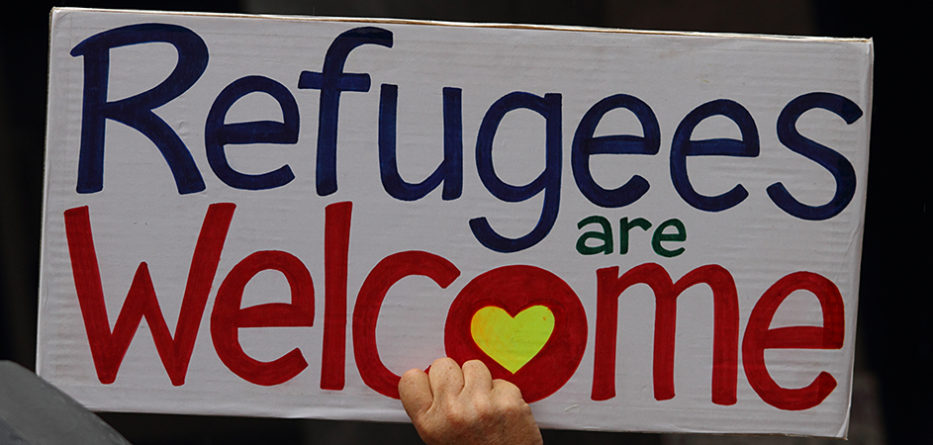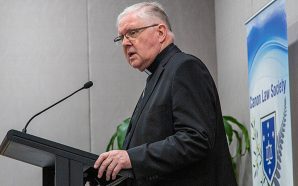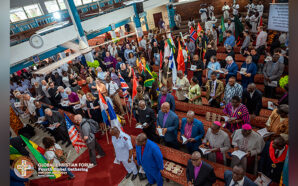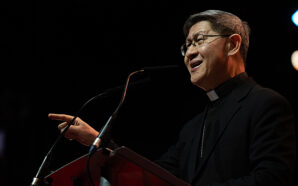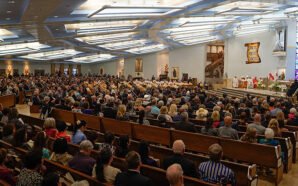Homily for the Seventh Sunday in Ordinary Time, Year A
Readings: Leviticus 19:1-2, 17-18; Psalm 102(103):1-4, 8, 10, 12-13; 1 Corinthians 3:16-23; Matthew 5:38-48
19 February 2023
This week, we hear more from Jesus’ Sermon on the Mount. The old law of Moses is to be taken up and fulfilled in his new law which contains universal prescriptions which are, frankly, unachievable.
‘You have heard that it was said,
“An eye for an eye and a tooth for a tooth”.
But I say to you….
Should anyone press you into service for one mile,
go for two miles.
Give to the one who asks of you,
and do not turn your back on one who wants to borrow.’
LISTEN: https://soundcloud.com/frank-brennan-6/homily-19223
Every now and again, we might go the extra mile when asked. But there’s no way we can do it every time. For every time we go the extra mile, there will be another dozen times when we don’t, when we can’t. Every now and again, we will show generosity to the person in need but there’s no way that we will be giving away most of our hard-earned savings to those who simply happen to ask for help. Once that started, they’d be queuing at our door.
‘You have heard that it was said,
“You shall love your neighbour and hate your enemy.”
But I say to you…..
if you love those who love you, what recompense will you have?
Do not the tax collectors do the same?
And if you greet your brothers only,
what is unusual about that?
Do not the pagans do the same?
So be perfect, just as your heavenly Father is perfect.’
This perfection of the Father is just so far beyond us. I might be able to show hospitality to some perfect strangers but not to a planet full of them, not even to all those in my street. This universal ethic of love is beyond us, even for those of us who are firmly committed to following the way of the Lord. It is way beyond us acting collectively as a society and as a nation.
In his message for last year’s World Day of Migrants and Refugees, Pope Francis said: “No one must be excluded. God’s plan is essentially inclusive and gives priority to those living on the existential peripheries. Among them are many migrants and refugees, displaced persons, and victims of trafficking. The Kingdom of God is to be built with them, for without them it would not be the Kingdom that God wants. The inclusion of those most vulnerable is the necessary condition for full citizenship in God’s Kingdom.”[1]
There is no way that we Australians can accommodate all refugees, displaced persons, victims of trafficking and those who would like to be migrants to a wealthy, secure country like ours. No matter who is in government, we will always fail the universal, borderless test put by Pope Francis. We will never measure up to the demands put by the Sermon on the Mount.
What then are we to do?
It was six years ago when wrestling with this question, and agreeing that the Australian refugee and asylum seeker policy was in a complete mess that John Menadue, Robert Manne, Tim Costello and I came together to try and work out what would be the best way forward.
The trouble had started with the 2013 election campaign when Kevin Rudd and Tony Abbott tried to outdo each other, pledging that the boats would be stopped and that anyone headed for Australia without a visa would never be permitted to settle here.
Once the ring of steel was erected with boats being deterred from setting out from Indonesia or Sri Lanka, or being stopped or turned back, we thought there was little point in trying to have the Coalition or Labor abandon the commitment to keeping the boats stopped. We conceded that those setting sail from Indonesia were most unlikely to be refugees suffering persecution in Indonesia but were asylum seekers understandably seeking a more benign migration outcome. We also conceded that those suffering persecution in Sri Lanka could seek asylum more readily in Tamil Nadu. These concessions understandably upset some refugee advocates. They could easily have quoted the Sermon on the Mount at us.
Having made these concessions, we argued that with the boats stopped, there was no reason to maintain punitive measures against the tens of thousands who had made it to Australian territorial waters by boat. Those proven to be refugees should be offered permanent resettlement in an appropriate third country or permanent residence in Australia. They should also be given the right to family reunion and the usual suite of benefits available to persons lawfully residing in Australia.
We made one additional concession to government authorities. We conceded that government could maintain an offshore processing regime in case of any unexpected influx of boats. But we were insistent that detention of asylum seekers, whether offshore or onshore, should be only for the purposes of identification, health, and security.
We then argued that there should be a moral dividend for the stopping of the boats, including an increased commitment to refugees and humanitarian cases in the annual migration program.[2]
We upset all sides in the debate equally. A change of policy has happily come to pass. It’s not perfect by a long shot, but it’s much more humane than what was in place for so long.[3] The Albanese government is to be applauded, and it’s time for the Dutton opposition to get on board. Compromise is difficult in this area of policy, but it can produce more decent results than any theoretical alternative. We can keep the boats stopped decently. But we need to admit that secure national borders are difficult to reconcile with the Sermon on the Mount.
Even if the new policy is as much as we can expect from our democratically-elected government which needs to be responsive to community concerns, is that all that is to be expected of us individually when we hear the Sermon on the Mount? Every one of us profits from the secure borders and the orderly migration program which are bought at the cost of universal welcome to those in need.
The Sermon on the Mount impels us always to do more and to seek forgiveness for our failure to right the wrongs around us, particularly when we profit from those wrongs, even if they be the wrongs of others rather than ourselves. Jesus knew his listeners could never measure up to the demands of the Sermon on the Mount but he was a light in the darkness giving them hope, purpose and direction. And today he does the same for us. We’ll never be perfect, but with his grace we can do and be more.
R: The Lord is kind and merciful.
He pardons all your iniquities,
heals all your ills.
He redeems your life from destruction,
crowns you with kindness and compassion.
R: The Lord is kind and merciful.
Merciful and gracious is the LORD,
slow to anger and abounding in kindness.
Not according to our sins does he deal with us,
nor does he requite us according to our crimes.
R: The Lord is kind and merciful.
As far as the east is from the west,
so far has he put our transgressions from us.
As a father has compassion on his children,
so the LORD has compassion on those who fear him.
R: The Lord is kind and merciful.
Fr Frank Brennan SJ is the Rector of Newman College, Melbourne, and the former CEO of Catholic Social Services Australia (CSSA). He was appointed a peritus at the Fifth Plenary Council of the Australian Catholic Church.
[1] Pope Francis, ‘Building the future with migrants and refugees’, 2002, available at https://www.vatican.va/content/francesco/en/messages/migration/documents/20220509-world-migrants-day-2022.html
[2] See https://www.theage.com.au/opinion/a-solution-to-our-refugee-crisis-20160812-gqqvhl.html and https://www.theguardian.com/commentisfree/2017/feb/14/we-can-stop-the-boats-and-also-act-decently-fairly-and-transparently?
[3] See https://www.eurekastreet.com.au/the-albanese-reset-stopping-boats-while-treating-onshore-asylum-seekers-decently?




